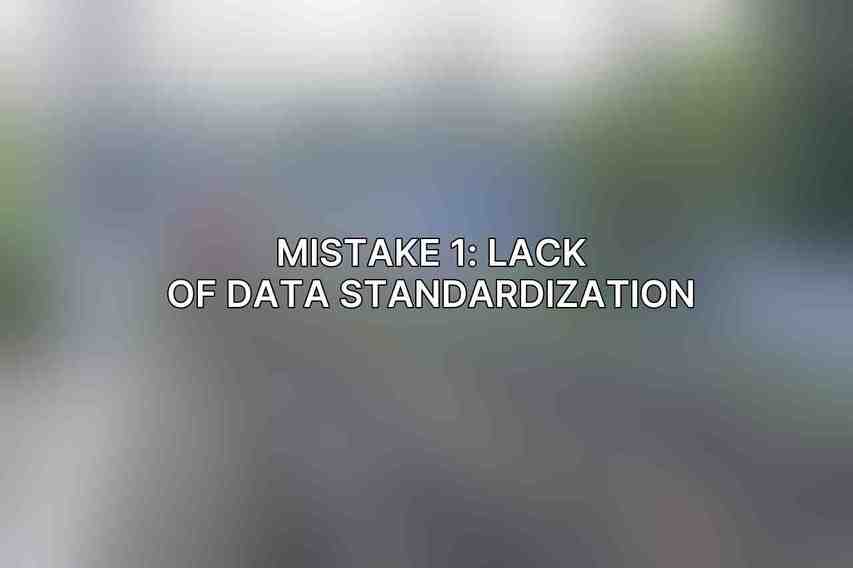Small businesses rely heavily on accurate reporting to make informed decisions and track their performance. Proper reporting is essential for monitoring financial health, identifying growth opportunities, and measuring success. However, many small businesses often fall victim to common reporting mistakes that can lead to inaccurate results and misguided decisions. Check this blog on Getting Started with Analytics and Reporting – A Beginner’s Guide for Small Businesses
Mistake 1: Lack of Data Standardization

In small businesses, data standardization is often overlooked, leading to inconsistencies in how data is collected, stored, and analyzed. This lack of standardization can result in unreliable reports and hinder decision-making processes. To address this issue, small businesses should establish clear data standards, use data validation tools, and educate employees on consistent data entry protocols. Read more about this on How to Integrate Analytics into Your Small Business Strategy Effectively
| Best Practices for Data Standardization |
|---|
| 1. Establish clear data standards |
| 2. Use data validation tools |
| 3. Educate employees on data protocols |
Mistake 2: Incomplete or Inaccurate Data

Incomplete or inaccurate data can significantly impact the quality of reports and distort the insights derived from them. Reasons for such errors may include human error, data entry issues, or outdated information. Small businesses can ensure data completeness and accuracy by implementing robust data collection procedures, utilizing data cleaning tools, and conducting regular data audits.
Mistake 3: Limited Analysis
Basic descriptive statistics may not provide the depth of insight necessary for businesses to thrive. Embracing advanced analytics techniques enables businesses to identify trends, predict future performance, and stay ahead of the competition. Small businesses can leverage tools and resources to perform advanced analytics, such as predictive modeling and data visualization software.
Mistake 4: Ignoring Contextual Factors
Failing to consider the contextual factors that influence data can lead to flawed interpretations and misguided decisions. Factors like market conditions, seasonal variations, and competitive world play a crucial role in understanding the data’s true implications. Small businesses should actively identify relevant contextual factors and adjust their reporting metrics and analysis accordingly.
Mistake 5: Failing to Share and Use Reports Effectively
A common oversight in small businesses is not effectively sharing and utilizing reports within the organization. Reports hold valuable insights that can guide strategic decision-making, but if not communicated properly, their impact diminishes. To address this, businesses should use clear and concise language, visualize data effectively, and ensure reports are accessible and actionable to all stakeholders.
By avoiding these top 5 reporting mistakes in your small business, you can enhance the quality of your reports, make more informed decisions, and ultimately drive better results. Remember, accurate reporting is not just about numbers; it’s about making sense of the data to propel your business forward. Find more on Master Business Decisions with Effective Reporting – A Small Business Guide
Frequently Asked Questions
What are some common reporting mistakes in small businesses?
Common reporting mistakes in small businesses include inconsistent data entry, ignoring key performance indicators, failing to reconcile accounts, not tracking expenses properly, and not being transparent with financial information.
How can inconsistent data entry affect a small business’s reports?
Inconsistent data entry can lead to inaccurate financial reports, which can result in poor decision-making, wasted time, and potential legal issues. It is crucial to maintain accurate and consistent data entry to ensure reliable reports. Dive deeper into Top Analytics Tools for Small Businesses – 2024 Guide
Why is it important to reconcile accounts regularly in small business reporting?
Regularly reconciling accounts helps small businesses identify errors, detect potential fraud, and ensure that financial records are accurate. Failure to reconcile accounts can lead to misstatements in financial reports.
What are key performance indicators (KPIs) and why are they important in reporting for small businesses?
Key performance indicators (KPIs) are measurable values that demonstrate how effectively a small business is achieving its key objectives. They are crucial in reporting as they provide insights into the company’s performance, strengths, and areas for improvement.
How can small businesses ensure transparency in their financial reporting?
Small businesses can ensure transparency in their financial reporting by maintaining accurate records, providing detailed explanations for financial decisions, disclosing potential conflicts of interest, and involving independent parties in audits. Transparency builds trust with stakeholders and helps prevent misunderstandings.

